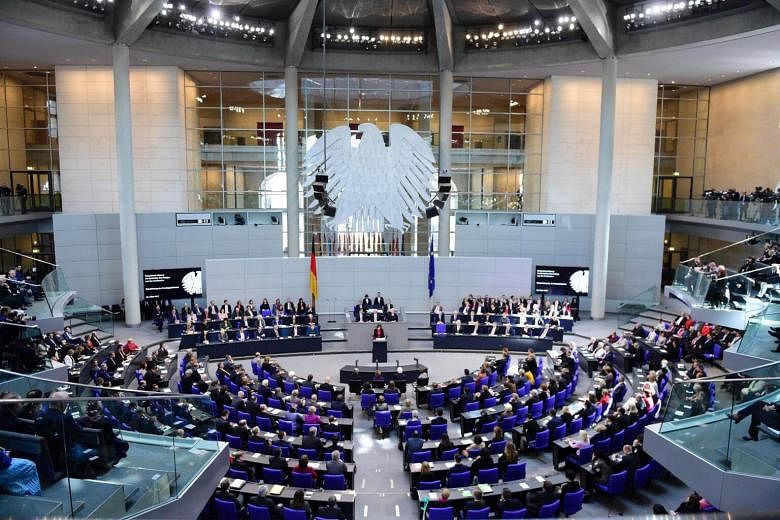BERLIN (BLOOMBERG) - German lawmakers laid out a sweeping series of conditions for Brexit talks with Britain and demanded a say on the final outcome.
A resolution to the lower house of parliament put forward by the governing parties sets out the Bundestag's terms for future access to the single market once Britain leaves the European Union, and imposes demands for the shape and duration of any transitional deal.
The document, which is the clearest iteration yet of Germany's position in the forthcoming talks, also rules out any deals that would allow access to the European market for specific industries.
The Bundestag will "follow the negotiations closely" and reserves the right to make its views known further down the line, the coalition caucuses say in the document obtained by Bloomberg News.
While non-binding, the draft has the support of both blocs in Chancellor Angela Merkel's coalition, and effectively gives orders to the government on how the Brexit negotiations should be conducted.
Lawmakers plan to approve the document in Berlin on Thursday (April 27), after Merkel delivers an address to the Bundestag on a summit of EU-27 leaders called for this weekend to discuss Britain's exit from the bloc.
After Brexit, Germany's parliament "supports the principle that the EU should treat Britain no better than, but also no worse than any other third country," Detlef Seif, a lawmaker in Merkel's Christian Democratic Union, said in an e-mailed statement.
"We're also calling for the EU to close ranks and speak with one voice in the negotiations."
As Europe's biggest economy and dominant country, Germany's stance is important to both the EU and British sides as each prepares for Brexit talks soon after Britain's general election on June 8.
While some in Britain have said that Germany's trading relations with Britain will sway its hand in the negotiations, Merkel has been clear that EU unity takes precedence.
'HISTORIC SUCCESS'
The four-page resolution, signed by the leaders of the three main parliamentary groups in the coalition, starts out by expressing regret at the outcome of last year's British referendum and says Germany will work for continued friendly relations, but quickly goes beyond the usual rhetoric.
European unity is a "historic success story without parallel" and "remains the most important national interest" for Germany, it says.
Britain's triggering of Article 50 "finally" lays to rest the uncertainties over starting the process of it quitting the bloc, during which "realistic expectations" must be held on both sides.
There will be negative consequences for all concerned, it says, "most of all for the United Kingdom itself."
The document reiterates the familiar refrain that access to the single market is inseparable from the "four freedoms," including the free of movement of people, and that it's not possible to pick and choose. British Prime Minister Theresa May has already ruled out Britain remaining a member of the single market post-Brexit.
However, it adds that any form of partnership must balance rights and obligations and that any future agreement must avoid any unfair competitive practices, in particular in the areas of tax, employee rights, the environment and financial markets.
"Financial-market stability in the EU cannot be threatened by regulatory dumping on the British side," it says.
A section of the document devoted to "transitional solutions" says that any such deals should be a last resort for a limited, defined period of time and only agreed if it becomes clear that negotiating deadlines won't be met, "particularly to avoid grave turmoil, for instance in financial markets."
What's more, any transitional arrangements must meet the same criteria as a final accord on future relations, and Britain must not be allowed to use such a deal to begin with "unfair competition" such as company subsidies, it said. To guard against that, EU Commission state-aid rules and competition controls must continue to apply.

